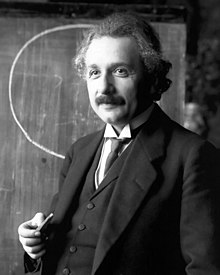 Albert Einstein in 1921 | |
| Born | 14 March 1879 Ulm, Kingdom of Württemberg, German Empire |
|---|---|
| Died | 18 April 1955 (aged 76) Princeton, New Jersey, United States |
| Residence | Germany, Italy, Switzerland, United States |
| Citizenship |
|
| Alma mater | |
| Known for | |
| Spouse |
|
| Awards |
|
| Signature | |
 | |
Albert Einstein (14 March 1879 – 18 April 1955) was a German-born theoretical physicist who developed the theory of general relativity, effecting a revolution in physics. For this achievement, Einstein is often regarded as the father of modern physics. He received the 1921Nobel Prize in Physics "for his services to theoretical physics, and especially for his discovery of the law of the photoelectric effect". The latter was pivotal in establishingquantum theory within physics.
Near the beginning of his career, Einstein thought that Newtonian mechanics was no longer enough to reconcile the laws of classical mechanics with the laws of theelectromagnetic field. This led to the development of his special theory of relativity. He realized, however, that the principle of relativity could also be extended to gravitational fields, and with his subsequent theory of gravitation in 1916, he published a paper on the general theory of relativity. He continued to deal with problems of statistical mechanics and quantum theory, which led to his explanations of particle theory and themotion of molecules. He also investigated the thermal properties of light which laid the foundation of the photon theory of light. In 1917, Einstein applied the general theory of relativity to model the structure of the universe as a whole.
He was visiting the United States when Hitler came to power in 1933, and did not go back to Germany, where he had been a professor at the Berlin Academy of Sciences. He settled in the U.S., becoming a citizen in 1940. On the eve of World War II, he helped alert President Franklin D. Roosevelt that Germany might be developing an atomic weapon, and recommended that the U.S. begin similar research. Later, together with Bertrand Russell, Einstein signed the Russell–Einstein Manifesto, which highlighted the danger of nuclear weapons. Einstein taught physics at the Institute for Advanced Study at Princeton, New Jersey, until his death in 1955.
Einstein published more than 300 scientific papers along with over 150 non-scientific works. His great intelligence and originality have made the word "Einstein" synonymous with genius.
Death
On April 17, 1955, Albert Einstein experienced internal bleeding caused by the rupture of anabdominal aortic aneurysm, which had previously been reinforced surgically by Dr. Rudolph Nissenin 1948. He took the draft of a speech he was preparing for a television appearance commemorating the State of Israel's seventh anniversary with him to the hospital, but he did not live long enough to complete it. Einstein refused surgery, saying: "I want to go when I want. It is tasteless to prolong life artificially. I have done my share, it is time to go. I will do it elegantly." He died in Princeton Hospital early the next morning at the age of 76, having continued to work until near the end.
Einstein's remains were cremated and his ashes were scattered at an undisclosed location. During the autopsy, the pathologist of Princeton Hospital, Thomas Stoltz Harvey, removedEinstein's brain for preservation, without the permission of his family, in hope that theneuroscience of the future would be able to discover what made Einstein so intelligent. In his lecture at Einstein's memorial, nuclear physicist Robert Oppenheimer summarized his impression of him as a person:
"He was almost wholly without sophistication and wholly without worldliness . . . There was always with him a wonderful purity at once childlike and profoundly stubborn."
Awards named after Einstein
The Albert Einstein Award (sometimes called the Albert Einstein Medal because it is accompanied with a gold medal) is an award intheoretical physics, established to recognize high achievement in the natural sciences. It was endowed by the Lewis and Rosa Strauss Memorial Fund in honor of Albert Einstein's 70th birthday. It was first awarded in 1951 and included a prize money of $15,000, which was later reduced to $5,000. The winner is selected by a committee (the first of which consisted of Einstein, Oppenheimer, von Neumann and Weyl) of the Institute for Advanced Study, which administers the award.
The Albert Einstein Medal is an award presented by the Albert Einstein Society in Bern, Switzerland. First given in 1979, the award is presented to people who have "rendered outstanding services" in connection with Einstein.
The Albert Einstein Peace Prize is given yearly by the Chicago, Illinois-based Albert Einstein Peace Prize Foundation. Winners of the prize receive $50,000

Tidak ada komentar:
Posting Komentar